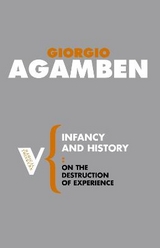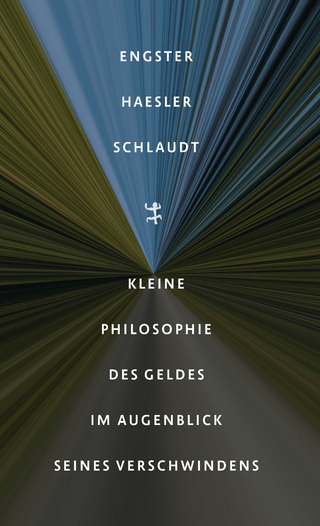
Infancy and History
Essays on the Destruction of Experience
Seiten
1993
Verso Books (Verlag)
978-0-86091-470-9 (ISBN)
Verso Books (Verlag)
978-0-86091-470-9 (ISBN)
- Titel erscheint in neuer Auflage
- Artikel merken
Zu diesem Artikel existiert eine Nachauflage
Argues that contemporary existence is marked by a denial of experience. Through explorations of the work of Kant, Hegel and Husserl, Agamben addresses the question of language and experience. His chapter on childhood and games explores the notion of "dumb", pre-linguistic experience.
How and why did experience and knowledge become separated? Is it possible to talk of an infancy of experience, a "dumb" experience? For Walter Benjamin, the "poverty of experience" was a characteristic of modernity, originating in the catastrophe of the First World War. For Giorgio Agamben, the Italian editor of Benjamin's complete works, the destruction of experience no longer needs catastrophes: daily life in any modern city will suffice.
Agamben's profound and radical exploration of language, infancy, and everyday life traces concepts of experience through Kant, Hegel, Husserl and Benveniste. In doing so he elaborates a theory of infancy that throws new light on a number of major themes in contemporary thought: the anthropological opposition between nature and culture; the linguistic opposition between speech and language; the birth of the subject and the appearance of the unconscious. Agamben goes on to consider time and history; the Marxist notion of base and superstructure (via a careful reading of the famous Adorno-Benjamin correspondence on Baudelaire's Paris); and the difference between rituals and games. Beautifully written, erudite and provocative, these essays will be of great interest to students of philosophy, linguistics, anthropology and politics.
How and why did experience and knowledge become separated? Is it possible to talk of an infancy of experience, a "dumb" experience? For Walter Benjamin, the "poverty of experience" was a characteristic of modernity, originating in the catastrophe of the First World War. For Giorgio Agamben, the Italian editor of Benjamin's complete works, the destruction of experience no longer needs catastrophes: daily life in any modern city will suffice.
Agamben's profound and radical exploration of language, infancy, and everyday life traces concepts of experience through Kant, Hegel, Husserl and Benveniste. In doing so he elaborates a theory of infancy that throws new light on a number of major themes in contemporary thought: the anthropological opposition between nature and culture; the linguistic opposition between speech and language; the birth of the subject and the appearance of the unconscious. Agamben goes on to consider time and history; the Marxist notion of base and superstructure (via a careful reading of the famous Adorno-Benjamin correspondence on Baudelaire's Paris); and the difference between rituals and games. Beautifully written, erudite and provocative, these essays will be of great interest to students of philosophy, linguistics, anthropology and politics.
Giorgio Agamben is Professor of Philosophy at the University of Venice. His works include The Coming Community, Homo Sacer and State of Exception.
| Erscheint lt. Verlag | 17.12.1993 |
|---|---|
| Übersetzer | Liz Heron |
| Verlagsort | London |
| Sprache | englisch |
| Maße | 142 x 224 mm |
| Gewicht | 294 g |
| Themenwelt | Geisteswissenschaften ► Philosophie ► Metaphysik / Ontologie |
| Geisteswissenschaften ► Philosophie ► Sprachphilosophie | |
| ISBN-10 | 0-86091-470-4 / 0860914704 |
| ISBN-13 | 978-0-86091-470-9 / 9780860914709 |
| Zustand | Neuware |
| Haben Sie eine Frage zum Produkt? |
Mehr entdecken
aus dem Bereich
aus dem Bereich
Buch | Hardcover (2024)
Matthes & Seitz (Verlag)
28,00 €
Über konstruktivistisches Denken in der Theologie
Buch | Softcover (2024)
Verlag Herder
58,00 €



